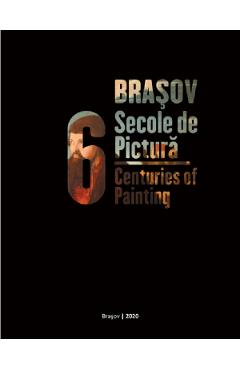
Brasov, 6 secole de pictura. Brasov, 6 Centuries of Painting
Brasov - 6 secole de pictura in 28 de capodopere (sec. XV-XX) /Brasov - 6 Centuries of Paintingin 28 Masterpieces (XV-XX th.c.) Editie bilingva romana-engleza Dezvoltat de timpuriu ca infloritor oras mestesugaresc si comercial, Brasovul a devenit in perioada Renasterii unul dintre cele mai importante centre artistice ale Transilvaniei. In aceste conditii, pictura de sevalet, dar si sculptura si pictura murala, au fost reprezentate prin numeroase creatii devaloare. Pictura brasoveana a cunoscut doua momente de inflorire, mai intai in prima jumatate asecolului XVI si apoi in prima jumatate a secolului XX, cand s-a impus ca un reper incontestabil alartei din spatiul romanesc si sud-estul Europei. Pictura murala din timpanul portalului de sud-est alBisericii Negre, Fecioara cu Pruncul intre sfintele Ecaterina si Barbara (sfarsitul secolului al XV-lea), este una dintre primele capodopere ale goticului transilvanean. Portretul judelui Lucas Hirscher III(1535), opera a lui Gregorius Pictor / Gregor Moler, este cea mai veche pictura laica de sevalet a arteiromanesti, iar Portretul lui Petrus Mederus cu familia sa (1664) este primul portret de grup laic cunoscut in pictura romaneasca. Brasovenii Constantin Lecca si Misu Popp au indeplinit un rol important in evolutia picturii romanesti moderne din secolul al XIX-lea. Dupa 1900 avangarda romaneascasi-a gasit reprezentanti de frunte in Hans Mattis-Teutsch si Hans Eder, artisti prin care expresionismul s-a afirmat in cadrul picturii romanesti interbelice. Traditia picturii brasovene a fost continuata si in perioada postbelica de catre Teodor Rusu, Eftimie Modalca, Friedrich von Bomches si altii.Acest album ilustreaza indelungata istorie a picturii brasovene, intinsa pe durata a peste sase secole de creatie artistica, prin intermediul celor mai importante capodopere din fiecare epoca istorica. Having developed from an early age as a city of crafts and trade, Brasov became one of themost important art centres of Transylvania during the Renaissance. Within this context, easel painting,but also sculpture and mural painting, were represented by numerous valuable creations. Brasov'spainting experienced two flourishing moments, the former in the first half of the 16th century and thelatter in the first half of the 20th century, when it established itself as an indisputable landmark of artin Romania and south-eastern Europe. The mural in the tympanum of the south-eastern portal of theBlack Church, Virgin Mary and the Child between Saints Catherine and Barbara (late 15th century), isone of the first masterpieces of Transylvanian Gothic. The Portrait of Lucas Hirscher III (1535), paintedby Gregorius Pictor / Gregor Moler, is the oldest secular easel painting in Romanian art, and The Portrait of Petrus Mederus With His Family (1664) is the first secular group portrait known in Romanianpainting. Constantin Lecca and Misu Popp, both from Brasov, played an important role in the evolution of modern Romanian painting in the 19th century. After 1900, the Romanian avant-garde foundits leading representatives in Hans Mattis-Teutsch and Hans Eder, artists due to whom expressionismasserted itself in interwar Romanian painting. The tradition of Brasov painting was continued in thepost-war period by Teodor Rusu, Eftimie Modalca and Friedrich von Bomches among others. Thisalbum illustrates the long history of Brasov's painting, spread over more than six centuries of artisticcreation, through the most important masterpieces of each historical era. - Dr. / PhD Radu Popica
50.00 Lei în magazinul Libris



